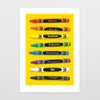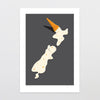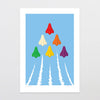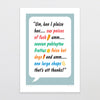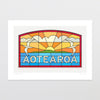Home-based Internet business Glenn Jones Art has created its own ‘Big Bang’ right around the world with its highly popular T-shirt designs and ‘Kiwiana’ art.
Glenn Jones Art is a family-centric, Internet-based business that operates from an office and the kitchen table in the Westmere, Auckland villa of Glenn and wife Julia.
Production and shipping are farmed out. The business doesn’t hold stock, has no employees and is self-funding.
Glenn and Julia are living the ‘Kiwi Dream’ – and some.
The business is extremely successful. Glenn has produced more than 300 art pieces and they’ve sold more than 20,000 prints. And that’s just their local enterprise.
His inspiration? Taking the familiar and the quirky from everyday life in New Zealand, adding a touch of humour and “adding his own spin”.
Ex-Takapuna Grammar (post-school he studied commercial art at Auckland’s Technical Institute but never completed the course), Glenn’s career took him through the rural press, a variety of design studios (gaining London brand experience for Unilever and Sainsburys), before becoming art director at an agency where he worked on packaging for Fonterra, Frucor, and created the TipTop logo.
Dashwood hired him in 2003 for a two-day freelance job and he left in 2008 as creative director.
“At night back in 2004, to keep my creative side alive, I'd design T-shirt prints for Chicago-based, online threadless.com. They invite potential buyers to vote on their favourite T-shirt designs.
“By 2006, I was their best-selling designer, and was contacted by some businessmen in Austin, Texas who flew me over and asked me to go into business [with them]. I’d do the designs and they'd do the rest.
“We formed ‘Glennz Tees’ and hit the jackpot when our melting Rubiks Cube Tee appeared on The Big Bang Theory, which is huge in America (syndicated some 140 times) and around the world.”
Sheldon Cooper wore it in the opening credits and it appeared four or more times in the series, he says.
“The great thing was, that design had been on our website for about two years and then an unknown wardrobe manager chose it. People Googled the tee which led straight to us, resulting in thousands of sales. We never found out who she or he was.
“You have to sell quickly, because in no time the tee was being ripped off by hundreds,” says Glenn.
“That’s the T-shirt game, I’m afraid. But it taught me several lessons. In the digital era, hard work, timing, luck, social media and persistence all come together in random ways. And it’s hard to repeat success. You must create, constantly.
“It’s pointless getting hung-up on the copyright issue; it’s the reality of the online business. Just let it go,” says Glenn. “Stay out front, keep creating and changing things. Add something. Evolve. And most importantly, use social media, with the help of experts, to create and reinforce a loyal fan base.”
Family-first business
Glenn designed the Santa-tracker for Google two-years in a row (he gave it up the third year when he and Julia had two youngsters keeping them up all night).
Facebook offered him a job, but he was determined to find a career that could work around their family.
Julia (a former engineer and construction project manager, who had worked on the Waterview tunnel and Auckland Airport projects) brings her management and administration skills to the business. “The only aspects of the business he hates,” she says.
Turnaround is quick. Glenn has an idea during the school run, and by morning tea time an art print is coming together on the screen. Late afternoon could see it on its way to a customer – the first of many. His quirky, nostalgic and humorous Kiwiana prints and derivative products (how about biscuit tins and dishcloths?) fly out to a loyal clientele.
He switches between producing two to three local original artworks and cool, catchy, sometimes geeky T-shirts for Glennz Tees – selling up a storm in the US, Brazil and Norway (the ultimate eclectic global market).
Julia points out women are the major buyers, so she is also the “market Glenn must pitch to”. He notes that aside from Julia, their three children also produce great ideas for the tees.
It is, after all, the family business they set out to create four years ago.
Full-on days
Business starts at 9.15 when Glenn returns from the school run. Julia dives into the admin – reviewing production, framing and shipping with Elliot Alexander at nearby Ponsonby’s Endemic World. Elliot’s a key adviser in their success, heading up their ‘fulfilment company’.
Julia also gets feedback from Adhesion, their chosen online ad agency, on the latest online trends and opportunities.
“These leading experts are totally in touch with everything and anything developing in their worlds,” says Julia. “We get the benefit of that. And we know we never could try to do that, and still be creative.
“In 2016, at Christmas, a peak time for orders, we realised we were flying, but we were not coping with issues like packaging and shipping; working late into the night. Planning was non-existent.
“Creativity suffers in that environment and that’s what we are about. NZ Trade and Enterprise came to our rescue, reinvigorating our thinking and the business.”
Says Glenn: “We had a great shopfront on the Shopify platform. They give us stats too. We were still nimble in our response time but we were trying to do everything.
“They helped us realise we couldn’t be experts in all aspects of a rapidly expanding, online, global business. We had to partner with experts, at some cost, but that would make for a better suite of products as we tapped their diverse experience and focused knowledge.
“And it freed us to focus on creating better art.
“The results were almost immediate,” adds Glenn. “We had four years of data to mine into, set real goals and plan. It works.”
Repeatedly, he stresses, Kiwis must appreciate the Internet is a global market; remoteness means nothing: So why limit yourself?
When they’re not beating up a storm on social media about the latest releases, Glenn and Julia sit back in the evening, once the children are asleep, and wonder how they could expand their knowledge and experience, with battle-hardened Internet nous, to another business.
It’s not easy, as the song goes.
That’s because the business would have to be product-to-order, employee-less, loan-less, work-from-home, and powered by energy and creativity.
Any ideas which meet those criteria? Email Glenn.





